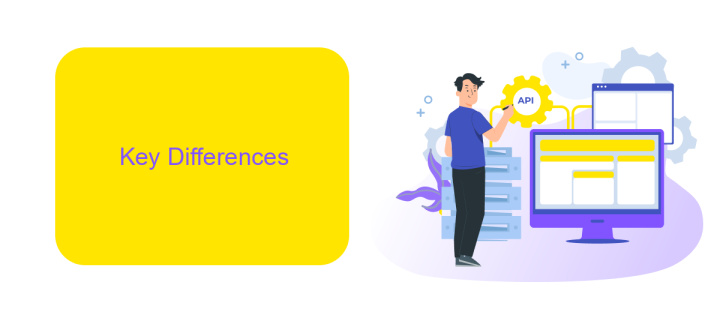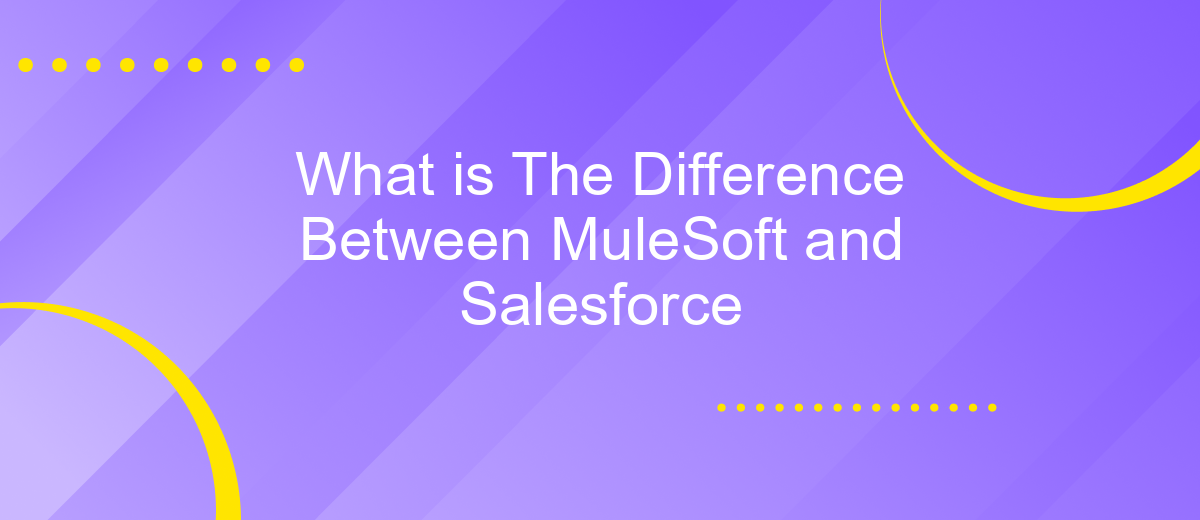What is The Difference Between MuleSoft and Salesforce
In today's rapidly evolving digital landscape, businesses are constantly seeking robust solutions to streamline their operations and enhance customer experiences. MuleSoft and Salesforce are two leading platforms that play pivotal roles in achieving these goals. While both are integral to modern IT ecosystems, they serve distinct purposes. This article delves into the key differences between MuleSoft and Salesforce, helping you understand their unique functionalities and benefits.
Introduction
Understanding the differences between MuleSoft and Salesforce is crucial for businesses aiming to optimize their operations through seamless integrations. MuleSoft, renowned for its Anypoint Platform, specializes in connecting applications, data, and devices across on-premises and cloud computing environments. On the other hand, Salesforce is a leading customer relationship management (CRM) platform that offers a suite of tools to manage customer interactions and business processes.
- MuleSoft: Focuses on API-led connectivity and integration.
- Salesforce: Provides CRM solutions to manage customer data and relationships.
- ApiX-Drive: Facilitates easy integration of various services and applications, enhancing both MuleSoft and Salesforce functionalities.
By leveraging these platforms, businesses can create robust, scalable systems that enhance productivity and customer satisfaction. ApiX-Drive serves as an additional tool to simplify the integration process, ensuring that different applications and services work harmoniously together. This article delves deeper into the distinct features and benefits of MuleSoft and Salesforce, helping you make an informed decision for your business needs.
Key Differences

While both MuleSoft and Salesforce are integral tools for businesses, they serve distinct purposes. MuleSoft specializes in API-led connectivity, allowing organizations to integrate various applications, data, and devices seamlessly. It provides a robust platform for building, managing, and monitoring APIs, which can be crucial for creating a unified ecosystem. On the other hand, Salesforce is a leading customer relationship management (CRM) platform, focusing on sales, customer service, and marketing automation. It offers a comprehensive suite of tools to manage customer interactions and data, driving business growth and customer satisfaction.
Another key difference lies in their integration capabilities. MuleSoft offers extensive support for complex integrations through its Anypoint Platform, making it a go-to solution for enterprises needing to connect multiple systems. Meanwhile, Salesforce also supports integrations but is more focused on enhancing its CRM functionalities. For businesses looking to streamline their integration processes, services like ApiX-Drive can be invaluable. ApiX-Drive simplifies the integration setup between various platforms, ensuring smooth data flow and operational efficiency. This makes it easier for companies to leverage the strengths of both MuleSoft and Salesforce in their operations.
Similarities

Both MuleSoft and Salesforce are integral tools in the modern business landscape, offering powerful solutions for integration and customer relationship management, respectively. Despite their different primary functions, they share several similarities that enhance their compatibility and usability.
- Integration Capabilities: Both MuleSoft and Salesforce excel in integrating various business systems. MuleSoft's Anypoint Platform and Salesforce's native integration tools simplify the process of connecting disparate systems.
- Cloud-Based Solutions: Both platforms offer cloud-based services, ensuring that businesses can scale their operations without worrying about infrastructure management.
- API Management: MuleSoft's Anypoint Platform and Salesforce's API capabilities allow for seamless data exchange and process automation, ensuring efficient workflows.
- Enhanced Productivity: Both platforms aim to boost productivity by automating routine tasks and providing real-time data access, enabling informed decision-making.
- Third-Party Integration: Services like ApiX-Drive can be used with both MuleSoft and Salesforce to further streamline integration processes, making it easier to connect a wide range of applications and services.
In summary, MuleSoft and Salesforce both offer robust solutions that can be integrated to provide comprehensive business management and integration capabilities. Their cloud-based nature, strong API support, and focus on productivity make them valuable assets for any organization looking to optimize its operations.
Use Cases and Integrations

MuleSoft and Salesforce serve different but complementary roles in the enterprise ecosystem. MuleSoft is primarily used for integrating various applications, data sources, and APIs, while Salesforce is a robust CRM platform designed to manage customer relationships and business operations. Together, they enable seamless data flow and process automation across an organization.
One common use case for MuleSoft is integrating Salesforce with other enterprise systems such as ERP, marketing automation platforms, and databases. This ensures that data is consistent and up-to-date across all systems. MuleSoft’s Anypoint Platform provides tools for designing, deploying, and managing APIs, making it easier to connect disparate systems.
- Real-time data synchronization between Salesforce and ERP systems
- Automated lead and contact data integration from marketing platforms to Salesforce
- Connecting Salesforce with legacy systems for a unified data view
- API management and monitoring for seamless interactions
ApiX-Drive can further enhance these integrations by offering a no-code solution for connecting Salesforce with various other applications. This service simplifies the setup process, allowing businesses to automate workflows without the need for extensive technical expertise. By leveraging both MuleSoft and ApiX-Drive, organizations can achieve a highly integrated and efficient operational environment.
Conclusion
In conclusion, while MuleSoft and Salesforce serve different primary purposes, they can complement each other to create a robust, integrated ecosystem for businesses. MuleSoft excels in connecting various systems, applications, and data sources through its powerful API-led connectivity, making it an excellent choice for organizations needing complex integrations. On the other hand, Salesforce is a leading CRM platform that offers extensive tools for customer relationship management, sales, and marketing automation.
For businesses looking to streamline their integration processes further, services like ApiX-Drive can be invaluable. ApiX-Drive simplifies the integration setup between various applications and services, making it easier to connect Salesforce with other platforms seamlessly. By leveraging the strengths of MuleSoft, Salesforce, and ApiX-Drive, organizations can achieve a highly efficient, connected, and customer-centric operational environment.


FAQ
What is MuleSoft?
What is Salesforce?
How do MuleSoft and Salesforce work together?
Can MuleSoft be used independently of Salesforce?
What are some alternatives to MuleSoft for integration and automation?
Strive to take your business to the next level, achieve your goals faster and more efficiently? Apix-Drive is your reliable assistant for these tasks. An online service and application connector will help you automate key business processes and get rid of the routine. You and your employees will free up time for important core tasks. Try Apix-Drive features for free to see the effectiveness of the online connector for yourself.

